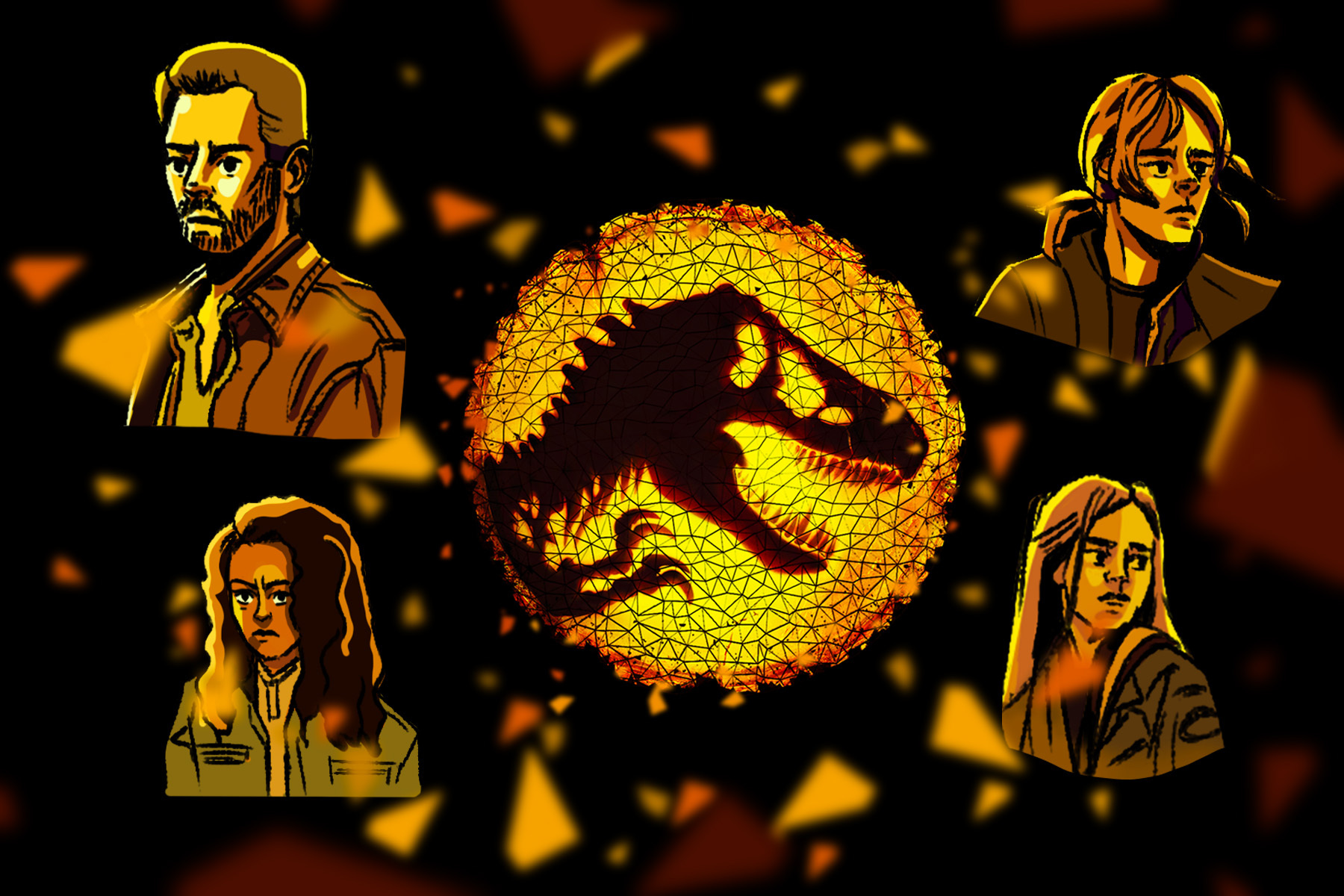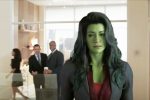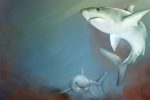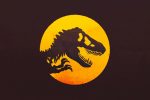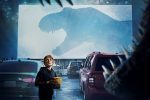The sixth and latest installment in the “Jurassic Park” franchise — “Jurassic World Dominion” — returns audiences to the fantastical world of dinosaurs, but removes the series’s cinematic magic while doing so. The previous “Jurassic Park” films have received both critical acclaim and audience praise because of their Spielbergian adventures, thoughtful writing and the gripping terror of the monstrous creatures they bring to life. Unfortunately for “Jurassic World Dominion” these features are nowhere to be found in the two-and-a-half-hour slog that bores more than it excites.
One of the new film’s greatest faults is its inability to continue the thematic form of its predecessors. The best “Jurassic Park” movies are highly formulaic, yet they execute their plotlines effectively by fleshing out a simple script with impeccable acting and well-constructed action scenes. The original “Jurassic Park” was a relatively simple story of an entrepreneur who constructed a dinosaur-filled park, guided by the ill-informed assumption he could control the genetic power that had brought the prehistoric creatures to life.
John Hammond, the park’s visionary, leads paleontologists Alan Grant and Ellie Sattler on a magical tour of his facility before technical errors cause the dinosaurs to break free from their paddocks and wreak havoc. During the film’s first half, the audience becomes acquainted with the human characters and comes to understand their slow discovery of the park’s magical yet dangerous nature. Once the dinosaurs begin their rampage, the exciting action transforms the film into a survival thriller as the horrifying reality of a world with dinosaurs becomes clear. The film does not aspire to be perceived as high art despite its thought-provoking themes, and its fun premise alongside carefully orchestrated action made it a film worth building an extensive franchise around.
“Jurassic World,” released in 2015, was a return to form for the franchise, a successful soft reboot that pushed the setting further by offering a look into a functional theme park attempting to correct the mistakes of the past. Set in the vibrant Jurassic World park, the setting extends the possibilities of genetic modification by playing host to the large and violent Indominus Rex, a monstrous concoction of T-Rex and Velociraptor genes. The film follows protagonists Owen Grady, an ex-Navy raptor trainer, and Claire Deering, an uptight park executive, as the Indominus Rex breaks out of its pen and attacks the park’s security forces and other animals. A sinister plot to weaponize the park’s velociraptors to combat the Indominus backfires once it is discovered that the mutant can communicate with the raptors thanks to their shared genome, a story beat that further underscores the danger of toying with a genetic force that is not fully understood.
The film’s new dinosaur is ultimately its greatest contribution to the identity of the franchise because the creature allows for the creation of a meta-commentary about an audience’s moviegoing expectations. Director Colin Trevorrow summarized the creature’s role in the script by saying: “We’re surrounded by wonder and yet we want more. And we want it bigger, faster, louder, better.” The film draws a parallel between its own audience and the throngs of people patronizing Jurassic World, for both demand breathtaking, mindless action. “Jurassic World” extends the franchise’s themes well beyond the original, yet the series’s newest film fails to follow in its predecessor’s inventive footsteps.
This franchise’s newest entry feels like a creative death knell, a forfeiture of creative energies to the easily crafted tropes of dumb action movies. However, the action feels pointless, and the story the film manages to scrape together is thoroughly uninspired. The plot’s defects are because of the awkward position the writers were placed in following the preceding film, “Jurassic World: Fallen Kingdom.” The previous film established a world in which dinosaurs have escaped their island habitat and now cohabitate with humanity, a premise that eliminates the suspenseful dynamic of the animals escaping from their confinement and shatters the protagonists’ false sense of security. “Jurassic World Dominion” follows Claire and Owen, who live in a remote cabin with their adopted daughter Maisie, who was born through asexual reproduction as a genetic clone of her mother. Her scientific value prompts militant mercenaries to track her down and kidnap her, transferring her to the headquarters of Biosyn, a corporation experimenting with dinosaurs and genetic cloning. Owen and Claire venture to Biosyn’s headquarters to retrieve Maisie and a raptor cub captured during her kidnapping, where they encounter Grant and Sattler, who are simultaneously touring the facility to understand the corporation’s role in engineering a dangerous species of locust.
It’s hard to imagine a “Jurassic Park” film in which the dinosaurs are pushed to the sidelines, yet that is what “Jurassic World Dominion” achieves, as the human conflict around Maisie and the locusts render the prehistoric beasts null for much of the film’s run time. The dinosaurs that are present are used disappointingly, most notably the velociraptors, which show a laughable tolerance of human characters despite their established violent behaviors. The T-Rex, perhaps the most infamous and exciting creature in “Jurassic Park,” is pointlessly shoehorned into the last 10 minutes of the film to fight two other dinosaurs in a contrived combat scene lacking the tension of the previous films’ climaxes.
Though the film does not forget about its titular creatures entirely, the dinosaurs could have been removed from the plot with only minor alterations required of the central story. The dinosaurs have always been a relatively simple plot device, used to chase characters from location to location, though the design of the set pieces or the actions of the characters have typically introduced variety to these sequences. The newest film lacks all creativity in this domain, with the dinosaurs losing the entirety of their fear factor as they aimlessly chase characters from Point A to Point B.
The best “Jurassic Park” films have been able to rely on the strength of their well-executed action scenes, however “Jurassic World Dominion” struggles to generate excitement in this arena beyond the misuse of its creatures. Scenes lack Spielberg’s trademark ingenuity, and any tension that might exist is evaporated away by the audience’s lack of investment in the plot or the characters. The absurdity of the action sequences’ parameters reaches a crescendo during a cinematic vignette in Malta where genetically modified dinosaurs are set loose on Owen and Claire as they hunt for Maisie. An extended vehicular chase sequence ensues, a vignette that makes the audience feel as though it is watching a “Bond” film rather than a “Jurassic Park” sequel.
The globe-hopping antics of the plot are a betrayal of another of the franchise’s key elements. When the dinosaurs break loose in the previous films, the script is flipped on the human characters: The once-contained animals are given free rein to hunt the humans, who are now the ones trapped within the finite territory of the island. The sequences that would develop from this dynamic were rife with discomfort and tension, feelings that defined the dinosaurs’ fearful on-screen identity. The only effective moment of tension comes when one of Biosyn’s largest carnivores forces Claire to crawl into a shallow pond and hide beneath its surface for an uncomfortably long period as the creature roars down at her. It lacks the flashy explosions or quick editing of many cliché-ridden action scenes, relying upon its anxiety-producing premise to sear itself in the audience’s memory. The film would have done better to include more moments with a similar effect, yet its desire to throw flashy distractions at its audience subverts this more substantive aim.
Thematic development has always been a central component of the “Jurassic Park” films, yet “Jurassic World Dominion” comes up short of developing a story that deals with meaningful ideas. Genetic manipulation has been the primary through-line, yet the newest film can’t push it in an interesting direction by focusing too heavily on Maisie’s character. The franchise’s best films have demonstrated the dangers of meddling with natural forces, illustrating how greed or the perception that the dinosaurs are products have compromised efforts to bring the creatures back from extinction responsibly. The danger posed by dinosaurs is a tired idea by now, and the film’s failed thematic pivot toward the human side of genetic modification comes up short as Maisie’s underwritten character does not result in an interesting narrative about the power of science when used for good.
The lack of a thematic core makes the rampaging dinosaurs’ antics even less suspenseful, as there is no established notion that the human characters are reckoning with the reality of the creatures meaningfully. The plot’s substandard writing and the action’s lack of traditional “Jurassic Park” punch create a concoction of a film that isn’t much to behold. “Jurassic World Dominion” has been announced as the final film in the franchise, and while this decision means the series will go out on a rather pathetic note, it ensures that a once-respected collection of films cannot be further tarnished by its own missteps.


